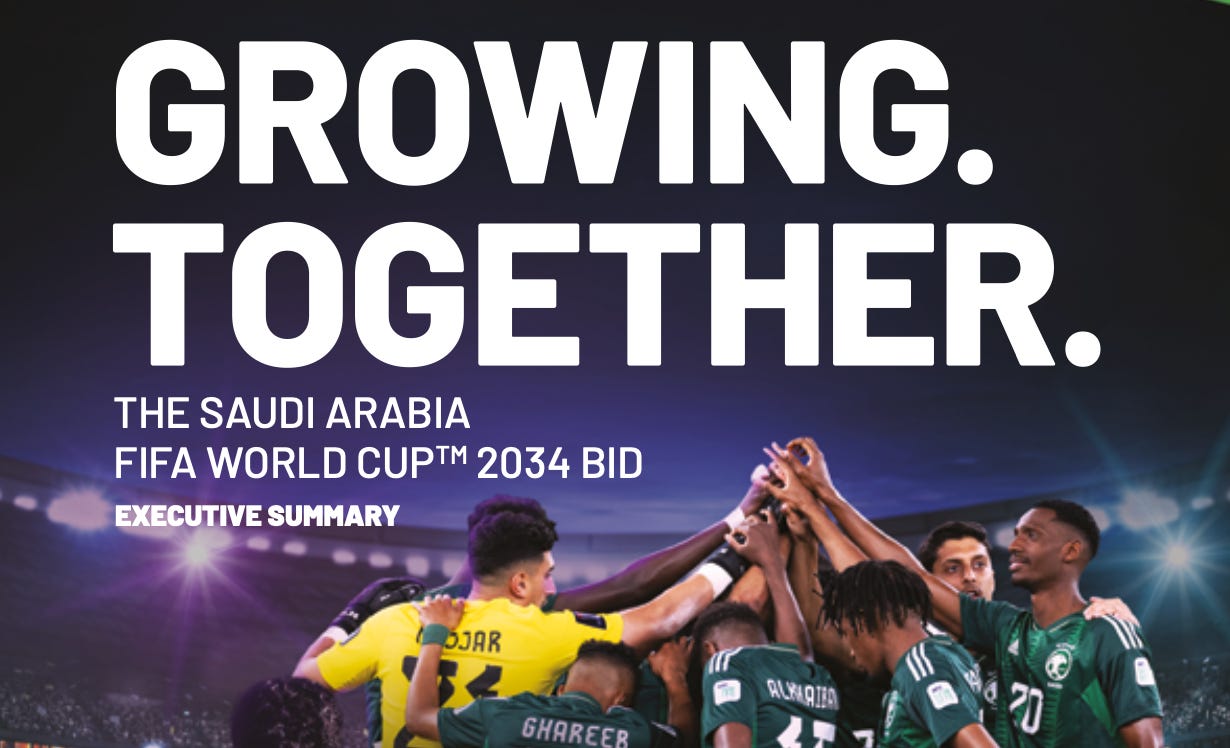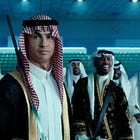Saudi Arabia is ascending; are journalists up to the task?
The kingdom infamous for the dismemberment of a prominent journalist is now set to host the 2034 World Cup. How will journalists ensure the regime is held accountable?
Welcome to Sports Politika, a media venture founded by investigative journalist and researcher Karim Zidan that strives to help you understand how sports and politics shape the world around us. Our mission is to offer an independent platform for accessible journalism that raises awareness and empowers understanding.
If you share this vision, please consider supporting us by joining our community and becoming a paid subscriber.
On Wednesday, FIFA unveiled details of Saudi Arabia’s bid to host the 2034 World Cup.
The official bid book outlines five proposed host cities for the international event: Riyadh, Jeddah, Al Khobar, Abha, and NEOM, emphasizing the kingdom’s ambitious infrastructure projects currently underway in preparation for the tournament.
The host cities will feature 11 new planned stadiums, including the 92,000-seat King Salman International Stadium in the Saudi capital of Riyadh, the futuristic Prince Mohammed bin Salman Stadium in the Qiddiya development, and the Aramco Stadium along the shores of the Arabian Gulf in Al Khobar. The proposal also includes 73 planned training facilities located throughout the country.
The kingdom also outlined its plans for a “responsible and respectful football future,” including its “commitment to environmental sustainability and human rights.”
“By embedding respect for the environment and human rights across the Competition lifecycle, the Saudi Arabian Football Federation aims to create a legacy of positive change that will inspire future generations,” read the official bid book.
“Through this journey, and in collaboration with our stakeholders, international partners, and local communities, we will inspire connections and nurture a strong, healthy society. We will support a new generation, who are united by environmental stewardship and the principles of human rights. Together we will work to achieve a sustainable and respectful football future.”
Having reported on Saudi Arabia since it unveiled its Vision 2030 masterplan in 2016, I've found the kingdom's self-proclaimed commitment to human rights to be largely a facade. Despite some minor improvements, Saudi Arabia has continued to commit numerous human rights abuses, including exploitation of migrant workers, crackdowns on dissent, suppression of free speech, and forced evictions. These issues will undoubtedly become more prominent in the lead-up to the 2034 World Cup.
Back in June, the Building and Wood Workers’ International (BWI) trade union filed a complaint to the United Nation’s International Labour organization (ILO), alleging the widespread use of forced labour among Saudi Arabia’s vast migrant workforce. A similar complaint was filed against Qatar in 2014, which eventually led to a partnership between the ILO and the 2022 World Cup host to reform its labour laws.
Saudi Arabia relies heavily on migrant workers, with more than 13 million foreigners in the country. That number is likely to increase significantly in the lead-up to the World Cup, and while the kingdom has introduced marginal labour reforms over the past few years, it continues to be accused of widespread abuse from various human rights organizations.
Much of the 2034 World Cup is expected to take place in locations where forced evictions have become commonplace. According to Amnesty International, more than half a million people in the Red Sea port city of Jeddah have been forcibly evicted and their homes demolished as the kingdom makes way for luxury hotels and other infrastructure.
Saudi Arabia has also evicted thousands of local bedouins to make way for The Line, which is part of the Neom gigaproject. At least three villages have been destroyed with Saudi authorities reportedly authorizing to use lethal force against villagers who resist eviction. Dozens were also detained for resisting eviction and were later tried on trumped-up terror charges. Several were sentenced to death.
Then there are the issues of Saudi’s disdain for free speech. In January, the kingdom jailed 12 Shia minority football fans for peacefully chanting a religious, apolitical song during a match in the country’s eastern province. The decision to target football fans raises a troubling parallel given that the kingdom is poised to host the 2034 World Cup. How can Saudi Arabia guarantee the safety of football fans when they can be so easily jailed for nothing more than a peaceful chant?
Similar to Qatar before the 2022 tournament, Saudi Arabia is likely to employ extensive public relations efforts to counter criticism or journalistic scrutiny. Expect to hear more about Saudi Arabia's "unprecedented change" and "remarkable growth" and less about its rising number of executions and instances of forced labor.
Journalists will also play a role in normalizing Saudi Arabia's rise as a global force in sports. We've already witnessed this following Saudi Arabia's acquisition of Newcastle United, its ventures in esports, and its emergence as a major patron of boxing. Once the initial outrage subsides, many will likely continue to report on Saudi Arabia's involvement in sports as just another aspect of the industry, rather than the machinations of a ruthless authoritarian regime.
Meanwhile, the precious few journalists who choose to report on the darker side of the 2034 World Cup will face more difficulties than they encountered in Qatar. Saudi Arabia, being a much larger and more influential country, is unlikely to show the same level of tolerance towards visiting journalists as Qatar did, while investigative reporting is likely to be met with intimidation and threats of legal action.
Nevertheless, it remains our responsibility to ensure that the kingdom infamous for the dismemberment of a prominent journalist is held accountable for its actions, and that its decision to host the 2034 World Cup is more than just the grandiose fantasy of a power-hungry prince.
Related Reading:
Sports Politika is a media platform dedicated to the intersection of sports, power and politics. If you like what you see, upgrade to a paid subscription ( or gift a subscription if you already have your own). We would appreciate if you could also like the post and let us know what you think in the comment section below.








